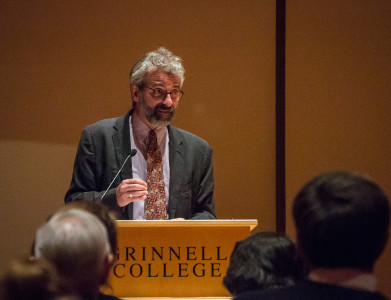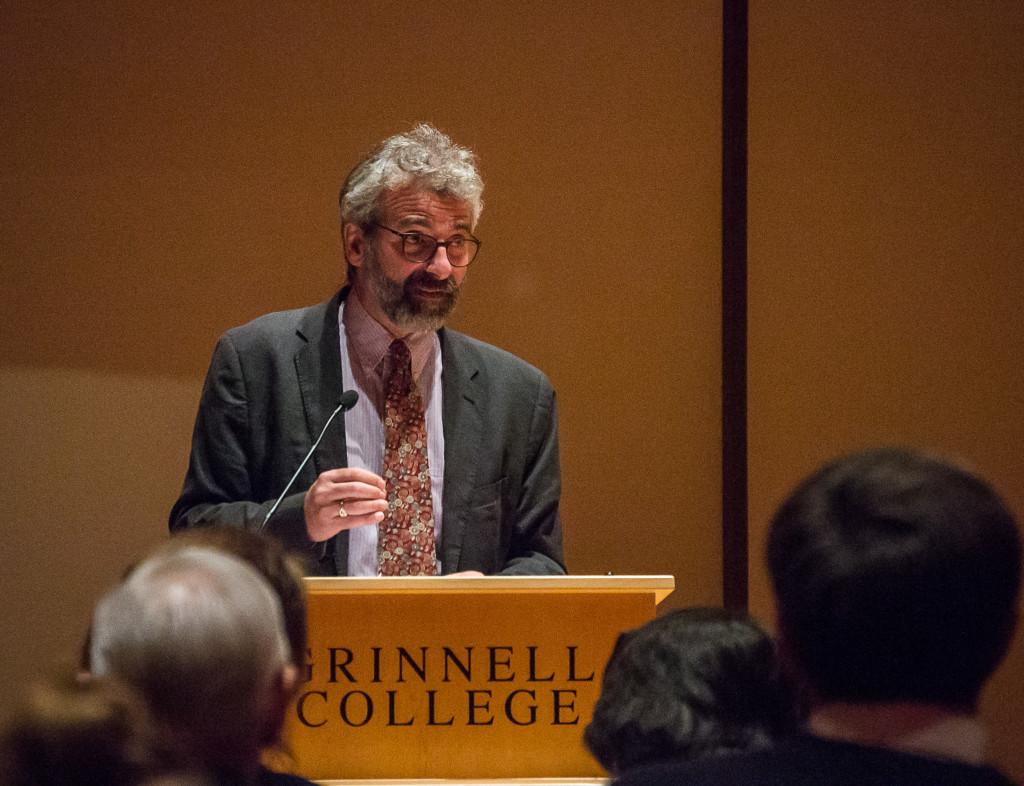
Lily Bohlke
bohlkeli@grinnell.edu
Although Laura Ingalls Wilder’s “Little House” books are filled with beautiful prose and progressive educational ideas, they also include troubling themes concerning imperialism and the dehumanization of Native Americans.
Dr. Daniel Perlstein came to the College on Monday, Nov. 9, to give a talk called “Little House in the Empire: Imperialism on the Literary and Educational Frontier.” Perlstein is a professor of Social and Cultural Studies in Education at the University of California, Berkeley and his lecture was sponsored by the Center for Prairie Studies as well as the Education and History departments.
Perlstein’s talk illuminated the way that Wilder’s stories create a sterilized narrative which only portrays a certain slice of life on the prairie, disregarding the oppression and violence against Native Americans and the taking of their land. They also romanticize the hands-on, do-it-yourself learning of life on a farm, which has problematic repercussions in modern American life such as ecosystem-killing lawn care.
First, his talk focused on the significance of the frontier in American educational thought and the connections between Wilder’s “Little House” books and John Dewey’s pedagogy on experiential learning.
“The pivotal role of the ideology of the frontier is a justification of settler colonialism, or imperialism,” Perlstein said. “That justification is the same in what we think is good about progressive education.”
Perlstein began by speaking on how in both Wilder’s novels and Dewey’s ideology, the goal is to “learn by doing and do by learning.” The pioneer homestead is portrayed as more desirable than typical American education where “learning is not doing, but the suspension of doing.”
In the “Little House” books, according to Perlstein, the more productive learning comes from useful tasks, such as when Pa teaches Laura to make a fish trap, and then catch and scale the fish. This is also reflected in Dewey’s focus on educational experience rather than the traditional classroom learning style.
“[Building the fish trap] is a wonderful education; it is better than virtually anything we do in school,” Perlstein said. “The closest many of us get to that is fake projects in elementary school.”
Despite these connections, Perlstein argues that the really troubling aspects of the Wilder books begin when Laura becomes a teacher.
Her critique of the traditional approach to learning is perhaps most clearly articulated when Laura comments that during her teaching career, “the only joy is the problem of the misbehaving boys.”
Perlstein contended that this vision of the pioneer homestead has procured a fascination with a do-it-yourself outlook on ownership in the American psyche.
“When I was a kid, I loved to mow the lawn because I had these pioneer daydreams,” he said. “Why do people mow their lawns? Because they feel like they are in ‘Little House on the Prairie.’”
The appealing, yet “systematically incorrect” setting, Perlstein suggested, is also justification for the settler colonialism of the Western frontier.
In the first book in the series, “Little House in the Big Woods,” Wilder describes the frontier as empty, with “nothing but woods” and “no people.” According to Perlstein, the encounters between Laura and Native Americans support the notion that Wilder was aware of this incorrect portrayal.
Not only were Native Americans substantially settled on the frontier Wilder pictures, but Perlstein explains that the books are set in specific years in which white settlers massacred natives.
“The Little House series opens in 1868, the year of the Washita Massacre, where the United States cavalry attacked the sleeping Cheyenne village, killing 100 men, women and children, among them survivors of the Sand Creek Massacre just four years before,” Perlstein said.
Although Wilder was aware of these horrors of the frontier, Perlstein argues that Wilder ignored them, choosing to highlight more sentimental activities.
“The economic activities we celebrate—churning butter, shaking plums—are distractions from the real economic activities,” Perlstein said. “They involved accumulation of land by genocide, and it was centrally organized, rather than the efforts of pioneers.”
Perlstein ended his talk by reaffirming that although the frontier was not this empty expanse of land for the taking, progressive education with roots in pioneer homestead behavior has good features.
“Progressive education is not betrayed by the racism, the imperial settler mentality of the “Little House” books, but it is enacted with it,” Perlstein said.





























































